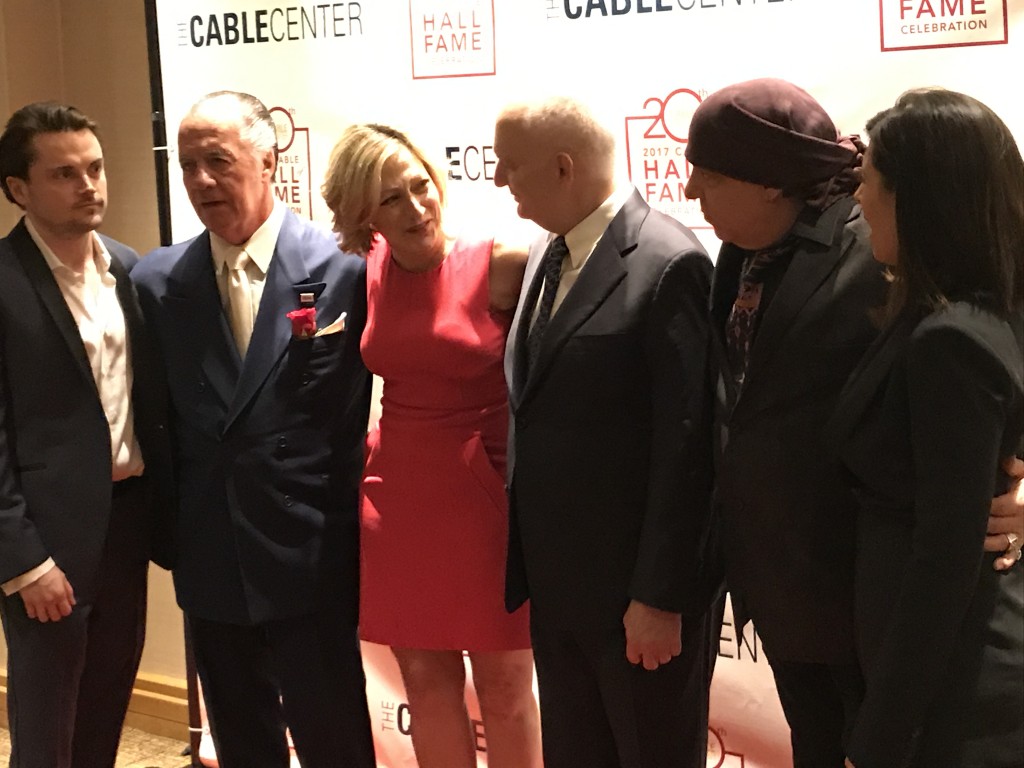 Ten years after it went off the air, “The Sopranos” briefly returned Wednesday in Washington, as its creator and a half dozen of its cast members were on hand as the HBO classic became the first show to be inducted into the Cable Hall of Fame.
Ten years after it went off the air, “The Sopranos” briefly returned Wednesday in Washington, as its creator and a half dozen of its cast members were on hand as the HBO classic became the first show to be inducted into the Cable Hall of Fame.
For a moment there they all were again — Paulie Walnuts, Silvio Dante, Carmelo Soprano and her kids Meadow and Anthony — still looking largely the same but not saying a word at the 20th induction ceremony of the Denver-based Cable Center.
And while those actors — Edie Falco, Steven Van Zandt, Tony Sirico, Jamie Lynn-Sigler and Robert Iler — all all posed for pictures, it was the creator David Chase, who spoke at the event in a ballroom deep inside the Washington Grand Hyatt.
“It makes us all feel so gratified to be the first cable television show to be recognized in this way,” Chase said. “We’re a little bit surprised because you had the chance to honor a lot of other shows. But it really is a treat for us, and we feel great.”
He thanked HBO executives for sticking with the show, “even though it hadn’t gone over well with focus groups. This is the most important part of the saga, as far as I’m concerned, because it doesn’t happen enough.
About series star James Gandolfini, who died in 2013 at 51, Chase said, “what can you say? People always ask me, ‘Why do you think “The Sopranos” was such a sensation, and why do we still love that awful Tony Soprano?’ And the answer, with no need to think, was James Gandolfini.
“I think you all know, just his eyes were enough to do the trick. People still love the guy.”
In a clip that accompanied the presentation, Chase said “we had three or four people as potential Tony Sopranos. But it was pretty obvious, he was the one.
“Why do people find an antihero so compelling?” he shrugged. “Why do girls in junior high find bad boys compelling? They don’t play by the rules, all of this have this desire not to be conformed by societal norms.”
Chase said he didn’t expect the show to last beyond its first season for a variety of reasons. “The pace of it was ‘slower’ than a network show. The lead character was a sociopath instead of a hero.”
But he and his writers were given a lot of leeway. “In terms of language and subject matter, we were free to do whatever we wanted to do,” he said. And that drew talent. “Right as the story elements and the character elements of motion pictures were receding, it was coming to the fore on TV. It was causing people who wanted to tell stories about people to look elsewhere, and then they saw a place for that on HBO or on cable.”
Chase said “Getting the stories right, that was the hardest part. It was also very creatively satisfying. The humor of the show was done simply depending on who we hired. All of the writers were picked for that reason. It was just written that way, in a sort of tragicomic style.”
Quality actors were attracted because, they, too, didn’t have to be tied down to the usual 22 episode run. “For an actor that means he gives up his whole year. But ‘The Sopranos’ and most cable, 13 is a season now or even shorter. So they’re not signing away their lives for five years.”
It set the standard for quality TV that continues today.
“‘Game of Thrones,’ the gentleman who produced that show, in the beginning said it was ‘The Sopranos’ with dragons,” Chase noted. “So I guess it still has an influence.”
“I’m just so happy the show still does resonate with people. It’s incredible,” Chase told me before the event got underway.
But what’s next from him? “I’m working on a miniseries for HBO right now. It’s about the early days of Hollywood.”
As for when it will run, Chase said, “You’ll have to ask them,” gesturing to HBO officials. “Hopefully 2018.”
He had closed his brief induction speech with another theory about “The Sopranos” success: “I believe that secretly all of us want a Paulie Walnuts in our life. Got an obnoxious clerk at the DMV? You text Paulie…”